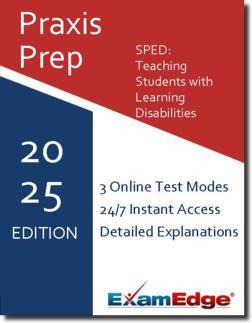Praxis Special Education: Teaching Students with Learning Disabilities (5383) Practice Tests & Test Prep by Exam Edge - Blogs
Based on 34 Reviews
- Real Exam Simulation: Timed questions and matching content build comfort for your Praxis SPED: Teaching Students with Learning Disabilities test day.
- Instant, 24/7 Access: Web-based Praxis Special Education Teaching Students with Learning Disabilities practice exams with no software needed.
- Clear Explanations: Step-by-step answers and explanations for your Praxis exam to strengthen understanding.
- Boosted Confidence: Reduces anxiety and improves test-taking skills to ace your Praxis Special Education Teaching Students with Learning Disabilities (5383).



